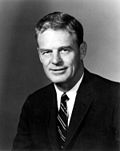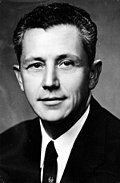This article needs to be updated.(July 2013) |
| |||||||||||||||||
| |||||||||||||||||
 County results Gurney: 50–60% 60–70% 70–80% Collins: 50–60% 60–70% | |||||||||||||||||
| |||||||||||||||||
| Elections in Florida |
|---|
 |
The 1968 Florida United States Senate election was marked by the election of the first Republican to the United States Senate from Florida since Reconstruction.
Contents
Democratic three-term incumbent George Smathers decided to not seek re-election. Popular former two-term Governor LeRoy Collins won the Democratic nomination by defeating State Attorney General Earl Faircloth, while Congressman Edward J. Gurney became the Republican candidate.
Gurney was much less well-known than Collins, but he won by a margin of over 11%. It is possible that Richard Nixon's victory in the presidential race (including winning Florida) helped Gurney defeat Collins. Gurney was the first Republican elected to the Senate from Florida since 1872.

